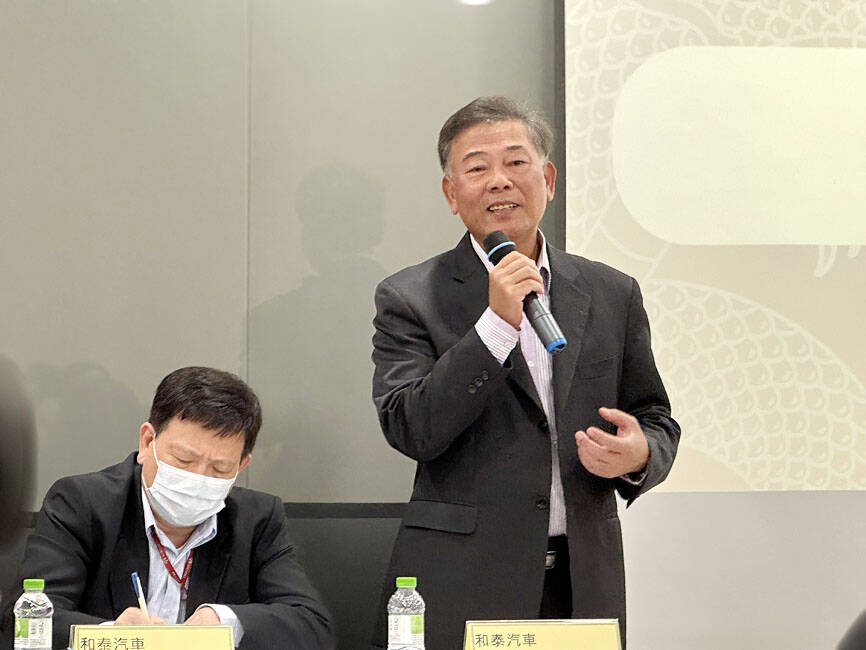Hotai Motor Co Ltd (和泰汽車), distributor of Lexus, Toyota and Hino cars in Taiwan, yesterday stood pat on its optimism about new car sales prospects this year.
The local automobile market is to register moderate growth this year, with more than 450,000 vehicles likely to be sold, it said.
The market is returning to normal, shaking off the disturbance from the COVID-19 pandemic, the company said.

Photo: Amy Yang, Taipei Times
Severe shortages of chips and components, and pandemic restrictions disrupted car production, leading to a large backlog of orders, Hotai spokesman Simon Liu (劉松山) told investors yesterday.
Last year was a phenomenal year, as a majority of those orders were fulfilled, boosting new car sales in Taiwan to 477,000 units, the strongest performance in 18 years, Liu said.
About 20,000 vehicles of last year’s total shipments were pushed back from 2022, he added.
In 2022, new car sales were at 430,000 units, down from 450,000 shipped in 2021, government data showed.
“We are expecting mild growth this year, as domestic demand looks quite resilient, aided by replacement demand as the government extends its tax incentives. We are not seeing any chip crunch. Most car manufacturers are operating smoothly,” Liu said.
“April is usually a slow season. We expect momentum to pick up in May or June when most carmakers and dealers launch annual sales campaign,” he added.
New car sales last month fell 41.4 percent month-on-month and 20 percent year-on-year to 26,267 units, government data showed.
During the first two months of this year, Hotai saw a decline of 10 to 20 percent in customer visits to its showrooms, as consumers took a wait-and-see attitude ahead of the results of the pre sidential elections, Liu said.
The long Lunar New Year holiday was also a factor that affected customer visits, he added.
“Unfavorable factors such as geopolitical tensions still could weigh on the market. Besides, global central banks’ monetary policy remains uncertain,” he said.
Hotai aims to grow vehicle sales by 2.4 percent annually to 170,000 vehicles this year, compared with 166,000 vehicles last year, Liu said.
That would raise the company’s market share to 37.8 percent, up from 34.9 percent last year, he added.
The growth would mostly be supported by an increase in sales of Toyota models to 136,500 vehicles, up 5.8 percent year-on-year, Liu said.
Meanwhile, sales of Lexus models would contract about 10 percent, given a smaller import quota from Toyota, Hotai said.
Last year, it secured an increased supply of 7,000 Lexus vehicles due to tepid China demand, the company said.
Lexus is Toyota’s luxury arm.
Hotai reported a record-high net profit of NT$22.86 billion last year, reversing a NT$19.33 billion loss from its insurance arm’s massive claims from COVID-19 policies.
Earnings per share last year were NT$41.03, an improvement from losses of NT$34.7 the prior year.
The company’s board of directors has approved the distribution of a cash dividend of NT$20 per share, representing a 48.74 percent payout ratio.

Intel Corp chief executive officer Lip-Bu Tan (陳立武) is expected to meet with Taiwanese suppliers next month in conjunction with the opening of the Computex Taipei trade show, supply chain sources said on Monday. The visit, the first for Tan to Taiwan since assuming his new post last month, would be aimed at enhancing Intel’s ties with suppliers in Taiwan as he attempts to help turn around the struggling US chipmaker, the sources said. Tan is to hold a banquet to celebrate Intel’s 40-year presence in Taiwan before Computex opens on May 20 and invite dozens of Taiwanese suppliers to exchange views

Application-specific integrated circuit designer Faraday Technology Corp (智原) yesterday said that although revenue this quarter would decline 30 percent from last quarter, it retained its full-year forecast of revenue growth of 100 percent. The company attributed the quarterly drop to a slowdown in customers’ production of chips using Faraday’s advanced packaging technology. The company is still confident about its revenue growth this year, given its strong “design-win” — or the projects it won to help customers design their chips, Faraday president Steve Wang (王國雍) told an online earnings conference. “The design-win this year is better than we expected. We believe we will win

Quanta Computer Inc (廣達) chairman Barry Lam (林百里) is expected to share his views about the artificial intelligence (AI) industry’s prospects during his speech at the company’s 37th anniversary ceremony, as AI servers have become a new growth engine for the equipment manufacturing service provider. Lam’s speech is much anticipated, as Quanta has risen as one of the world’s major AI server suppliers. The company reported a 30 percent year-on-year growth in consolidated revenue to NT$1.41 trillion (US$43.35 billion) last year, thanks to fast-growing demand for servers, especially those with AI capabilities. The company told investors in November last year that

Power supply and electronic components maker Delta Electronics Inc (台達電) yesterday said it plans to ship its new 1 megawatt charging systems for electric trucks and buses in the first half of next year at the earliest. The new charging piles, which deliver up to 1 megawatt of charging power, are designed for heavy-duty electric vehicles, and support a maximum current of 1,500 amperes and output of 1,250 volts, Delta said in a news release. “If everything goes smoothly, we could begin shipping those new charging systems as early as in the first half of next year,” a company official said. The new